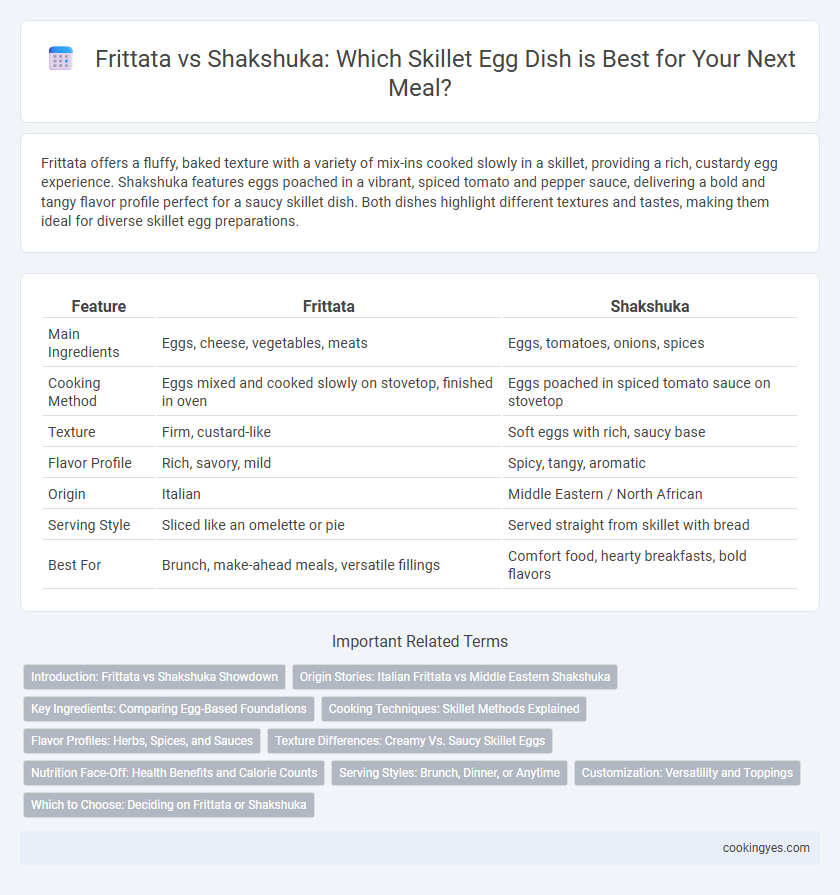Frittata offers a fluffy, baked texture with a variety of mix-ins cooked slowly in a skillet, providing a rich, custardy egg experience. Shakshuka features eggs poached in a vibrant, spiced tomato and pepper sauce, delivering a bold and tangy flavor profile perfect for a saucy skillet dish. Both dishes highlight different textures and tastes, making them ideal for diverse skillet egg preparations.
Table of Comparison
| Feature | Frittata | Shakshuka |
|---|---|---|
| Main Ingredients | Eggs, cheese, vegetables, meats | Eggs, tomatoes, onions, spices |
| Cooking Method | Eggs mixed and cooked slowly on stovetop, finished in oven | Eggs poached in spiced tomato sauce on stovetop |
| Texture | Firm, custard-like | Soft eggs with rich, saucy base |
| Flavor Profile | Rich, savory, mild | Spicy, tangy, aromatic |
| Origin | Italian | Middle Eastern / North African |
| Serving Style | Sliced like an omelette or pie | Served straight from skillet with bread |
| Best For | Brunch, make-ahead meals, versatile fillings | Comfort food, hearty breakfasts, bold flavors |
Introduction: Frittata vs Shakshuka Showdown
Frittata and shakshuka are popular skillet egg dishes with distinct cultural origins and cooking techniques. Frittata, an Italian staple, features beaten eggs mixed with vegetables, cheese, and meats, cooked slowly and finished under the broiler or stovetop. Shakshuka, a North African and Middle Eastern dish, consists of eggs poached in a spicy tomato and pepper sauce, delivering bold, savory flavors.
Origin Stories: Italian Frittata vs Middle Eastern Shakshuka
Italian frittata traces its origins to ancient Rome, characterized by beaten eggs mixed with vegetables, cheese, and meat, cooked slowly in a skillet. In contrast, Middle Eastern shakshuka features eggs poached in a spiced tomato and pepper sauce, with roots in North African and Levantine culinary traditions. Both dishes highlight regional flavors while showcasing skillet eggs as a versatile and hearty meal option.
Key Ingredients: Comparing Egg-Based Foundations
Frittata features whisked eggs combined with ingredients like cheese, vegetables, and meats, creating a thick, baked egg base that sets slowly in the skillet. Shakshuka uses whole eggs poached in a rich tomato sauce infused with spices such as cumin, paprika, and garlic, resulting in a saucy, flavorful egg dish. The key difference lies in the egg preparation: blended and firm in frittata versus gently cooked and runny in shakshuka.
Cooking Techniques: Skillet Methods Explained
Frittata cooking involves slowly cooking beaten eggs with fillings in a skillet, often finished under a broiler to set the top evenly, creating a dense, cohesive dish. Shakshuka uses a skillet to poach whole eggs in a simmering, spiced tomato and pepper sauce, resulting in distinct, runny yolks surrounded by flavorful sauce. Both techniques leverage skillet heat distribution but differ in texture and flavor infusion methods.
Flavor Profiles: Herbs, Spices, and Sauces
Frittata offers a rich, creamy flavor profile enhanced by fresh herbs such as basil, parsley, and chives, combined with subtle spices like black pepper and nutmeg, creating a delicate balance that complements the eggs. In contrast, shakshuka features robust, bold flavors from spices like cumin, paprika, and chili, along with savory tomato sauce and garlic, delivering a tangy and spicy depth. The creamy texture of frittata melds with its mild seasoning, while shakshuka's vibrant, saucy base provides a zesty, aromatic experience.
Texture Differences: Creamy Vs. Saucy Skillet Eggs
Frittata offers a dense, creamy texture created by slowly cooking beaten eggs with cheese and vegetables, resulting in a custard-like consistency. Shakshuka features eggs poached in a spiced tomato sauce, delivering a saucy, chunky texture that contrasts with the smoothness of a frittata. The difference in textures highlights frittata's rich creaminess versus shakshuka's vibrant, sauce-infused bite.
Nutrition Face-Off: Health Benefits and Calorie Counts
Frittatas offer a protein-rich option with eggs, cheese, and vegetables, typically providing higher calorie content due to added dairy and oils, while shakshuka features poached eggs in a spiced tomato sauce, delivering fewer calories and abundant antioxidants from tomatoes and peppers. Nutritionally, frittatas supply more fat and calories but also more calcium and vitamin D, whereas shakshuka excels in vitamin C and lycopene intake, promoting heart health and immune support. Choosing between them depends on dietary goals: frittatas for higher protein and fats, shakshuka for lower calorie, antioxidant-dense meals.
Serving Styles: Brunch, Dinner, or Anytime
Frittata offers versatile serving styles, perfect for brunch, dinner, or anytime with its baked, sliceable format that pairs well with salads and breads. Shakshuka features a saucy, spiced tomato base with poached eggs, ideal for casual meals like brunch or dinner, served directly from the skillet. Both dishes cater to different textures and flavor profiles, making them adaptable for varied dining occasions.
Customization: Versatility and Toppings
Frittata offers greater customization with infinite toppings like vegetables, cheeses, and meats mixed directly into the eggs, allowing for personalized flavors and textures. Shakshuka centers on a spiced tomato base with eggs poached on top, providing less flexibility in ingredient variation but rich, consistent flavor profiles. The versatility of a frittata makes it ideal for adapting to dietary preferences and seasonal ingredients, while shakshuka excels in delivering a bold, unified taste experience.
Which to Choose: Deciding on Frittata or Shakshuka
Frittata offers a versatile, Italian-style skillet egg dish characterized by beaten eggs mixed with vegetables, cheese, and meats, then slowly cooked and sometimes finished under a broiler for a firm texture. Shakshuka is a North African and Middle Eastern dish featuring eggs poached in a spicy tomato and pepper sauce, delivering a bold, tangy flavor profile. Choose Frittata for a hearty, customizable meal with a dense, custardy consistency, while Shakshuka is ideal for those seeking a saucier, zesty option with rich, aromatic spices.
Frittata vs Shakshuka for skillet eggs Infographic

 cookingyes.com
cookingyes.com